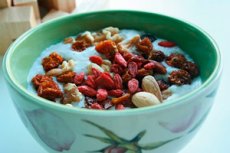Medical expert of the article
New publications
Goji berries for diabetes
Last reviewed: 04.07.2025

All iLive content is medically reviewed or fact checked to ensure as much factual accuracy as possible.
We have strict sourcing guidelines and only link to reputable media sites, academic research institutions and, whenever possible, medically peer reviewed studies. Note that the numbers in parentheses ([1], [2], etc.) are clickable links to these studies.
If you feel that any of our content is inaccurate, out-of-date, or otherwise questionable, please select it and press Ctrl + Enter.

Today, you can increasingly see on the Internet pages references to such overseas guests as goji berries - a product used for excess weight and diabetes. These berries are reddish-orange in color, resembling large sea buckthorn in appearance, grow on the slopes of the Himalayas in the region of Mongolia and Tibet. The fertile land, protected from the influence of civilization, gives them a special healing power.
Benefits
Goji berries have a unique composition, represented by eighteen amino acids, eight polysaccharides and more than twenty minerals. Goji berries have an incredibly high content of vitamin C. And the amount of beta-carotene and vitamin A allows you to use this amazing gift of nature to improve your vision along with the popular blueberry.
In terms of chemical composition and antioxidant effect, no other known fruit, vegetable or berry can compare with goji berries. In our country, these healthy berries are fashionable to use to combat excess weight, but a product with such a rich composition is capable of much more. In China, goji is used to treat diabetes, since it has been noted that they can significantly reduce blood sugar levels in type 2 diabetes, stabilize blood pressure and prevent such unpleasant complications of diabetes as microangiopathy, fatty degeneration of the liver, and the development of cardiovascular pathologies.
Tibetan doctors claim that regular consumption of goji berries allows you to:
- normalize blood pressure,
- reduce the risk of developing cancer,
- reduce the level of bad cholesterol in the blood,
- normalize blood glucose levels,
- lose extra pounds and prevent new ones from appearing,
- improve the condition of the nervous system, ensuring a good night's sleep,
- get rid of headaches and dizziness,
- increase visual acuity and prevent the development of eye diseases,
- improve memory and thinking skills,
- normalize the functioning of the digestive system,
- cleanse the liver,
- improve the condition of skin, hair and nails,
- increase the body's defenses.
It is believed that these overseas berries enhance male sexual activity and improve reproductive function, strengthen the heart and blood vessels, help women to endure the menopause period more easily, take an active part in the process of hematopoiesis, stabilizing the blood composition, help rapid tissue regeneration during wound processes, have a positive effect on the kidneys, bone and muscle tissue, improve mood. This is a kind of storehouse of useful effects that help a person feel cheerful, young and healthy for a long time.
Endocrinologists and nutritionists recommend eating 20-30 pre-dried berries a day for diabetes. However, goji berries can be eaten not only in their pure form, but also used to make a healing tea (no more than 1 tablespoon of berries per 1 glass of boiling water, leave until cool, drink warm between meals up to 3 times a day).
Alternatively, healthy berries can be added to various dishes: porridge, cocktails, yogurt, desserts that are prepared for breakfast or lunch. It is believed that before lunch, when carbohydrate foods can be consumed, the effect of berries will be more relevant.
Fresh goji berries, although they do not increase blood sugar levels, are considered quite toxic, so you should not get carried away with them, especially as a separate dish.
 [ 1 ]
[ 1 ]
Contraindications
These fruits, popular nowadays due to the craze for easy weight loss, contain so many useful substances that you will not find in any other known berry, have another advantage - a small number of contraindications for use. Their ability to reduce high blood pressure may not be beneficial for people suffering from hypotension. And the stimulating effect on the intestines can cause unpleasant symptoms in colitis and enteritis.
It is also not advisable for those who take medications that reduce blood viscosity to consume these berries, as this increases the risk of bleeding.
Allergic reactions associated with berry consumption are rare. However, allergy sufferers should be on the alert, starting with a small amount of berries and gradually increasing the dose.

